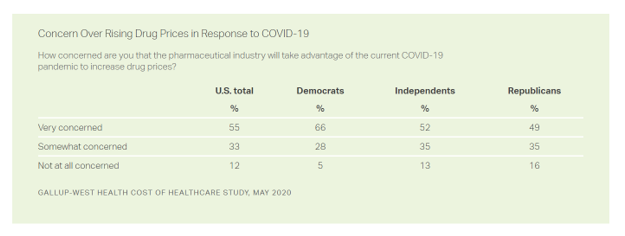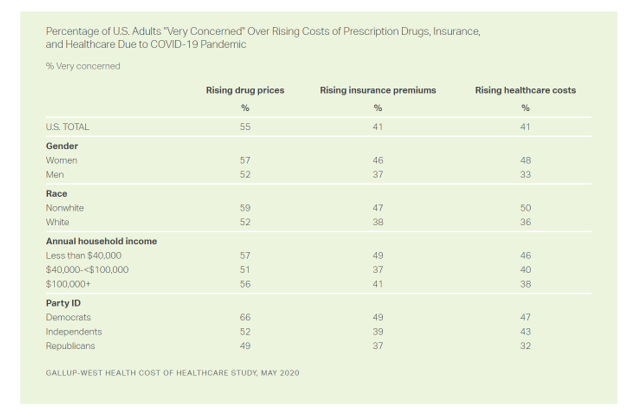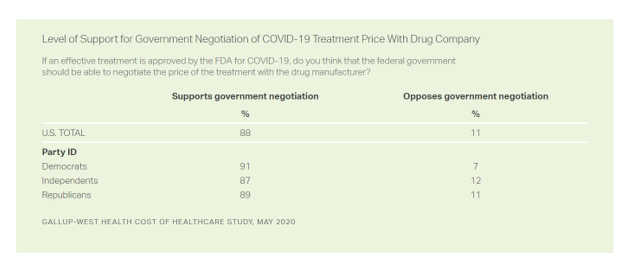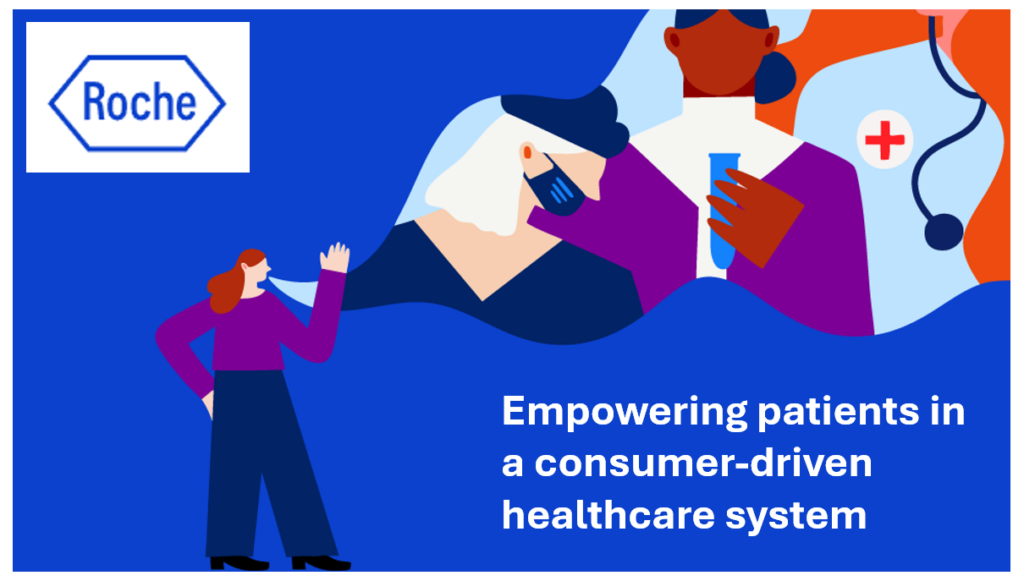
Nine in ten Americans is concerned about the price of prescription drugs in the wake of the coronavirus pandemic, Gallup and West Health found in their survey on the cost of healthcare, published today.
A majority of people across political party share this concern: overall, 88% of U.S. adults are concerned about rising drug prices in response to COVID19, split across party ID with:
- 94% of Democrats,
- 86% of Independents, and
- 84% of Republicans.
 By demographics, more women than men are concerned about rising costs for the three health care spending categories the survey studied: drug prices, insurance premiums, and healthcare costs (medical care services spending).
By demographics, more women than men are concerned about rising costs for the three health care spending categories the survey studied: drug prices, insurance premiums, and healthcare costs (medical care services spending).
Across-the-board, nonwhites are more concerned than whites on the three spending categories, as well.
Interestingly, rising drug prices are as concerning for as many people earning over $100,000 a year as Rx costs are for people earning less than $40,000.
Rising insurance premiums and healthcare costs are very concerning for fewer people identifying as Independent or Republican, but still garnering a plurality at 39% of Independents and 37% of Republicans for premiums; and, 43% of Independents and 32% of Republicans for healthcare costs.
Most U.S. consumers have been supportive of government negotiation for drug pricing since well before the COVID-19 pandemic. A Kaiser Family Foundation poll covered here in Health Populi demonstrated support across party ID back in October 2019.
 The Gallup-West Health Poll finds similar massive support for government negotiation specifically for COVID-19 treatment pricing, shown in the third table.
The Gallup-West Health Poll finds similar massive support for government negotiation specifically for COVID-19 treatment pricing, shown in the third table.
Gallup and West Health polled 1,016 U.S. adults 18 and older, in English and Spanish, in May 2020.
Health Populi’s Hot Points: The issue of drug and vaccine pricing for COVID-19 prevention and treatments has been under the media microscope since the start of the pandemic. Here’s one of many looks into the issue, in which I’m quoted on scenarios for Gilead’s possible pricing strategies for remdesivir.
The New England Journal of Medicine published an essay on June 4, 2020, titled, Specialty Drugs–A Distinctly American Phenomenon (my apologies–the article is behind the NEJM paywall). The authors, Dr. Naci and Dr. Kesselheim, are affiliated with the London School of Economics and Brigham and Women’s Hospital in Boston, note that 1% of medicines dispensed under Medicare Part D and Medicaid accounted for nearly $1 in $3 of drug spending in each program in 2015. Furthermore, net spending on these expensive “specialty drugs” increased from $8.7 bn to $32.8 bn between 2019 and 2015 (Part D) and from $4.8 bn to $9.9 bn for Medicaid.
The phrase “specialty drugs” originated in the 1970s in the advent of injectable and infusion therapies. They were so-called “special” because they were rare and few in number, requiring special handling. In today’s pharma/biotech market, the “specialty” label is given to many therapies: for products addressing rare diseases, risk-management, and above all, high cost drugs.
CMS defines specialty drugs as therapies with monthly costs over $670.
The authors of the NEJM essay propose shedding the phrase entirely, and dealing head-on with the value of medicines: which therapies deliver value for money in terms of patient outcomes relative to other available products on the market. Other countries outside of the U.S. have been using this paradigm for years, informing formulary design, payment and ultimately pricing strategies.
Just as telehealth has found bipartisan support in the pandemic era, as patients have gained experience with virtual visits and Zoom’ing with family, friends, and physicians, so has support for prescription drug pricing negotiation spanned health consumer support across party ID. While the cross-party bridges for mask-wearing and physical distancing may not yet be built, there’s universal political support from the voter-ground for dealing with the price of prescription drugs in America which, as the NEMJ authors call out, is a distinctly American phenomenon.




 I was invited to be a Judge for the upcoming
I was invited to be a Judge for the upcoming  Thank you Team Roche for inviting me to brainstorm patients as health citizens, consumers, payers, and voters
Thank you Team Roche for inviting me to brainstorm patients as health citizens, consumers, payers, and voters  For the past 15 years,
For the past 15 years,